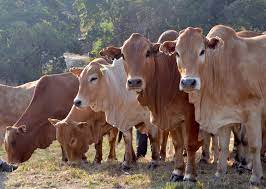
Agriculture
Farmers urged to rear hybrid livestock breeds
November 25, 2021 / Admin

There is a need for farmers in the country to adopt the rearing of hybrid breeds of livestock which are highly productive in order to substantially benefit from their activities, this is the view of Nyasha Mbenje, Director for Ntheu-based Well-done Livestock Suppliers (WLS).
Mbenje, whose organization breeds and sells highly productive Boer goats to farmers told Agri Business Review, that rearing of hybrid livestock can hugely benefit farmers through increased income from meat and milk sales as well as assist in boosting the national forex reserve through export of animal products.
She, therefore, advised Veterinary and Livestock Development Department (VLDD) in the Ministry of Agriculture to make sure that hybrid breeds of livestock are made available and accessible to farmers across the country.
Mbenje, however, applauded government for showing interest in encouraging farmers to venture into serious animal production through providing them with Boer goats which, she said, would help them realise their economic dreams besides helping the country meet the population’s demand for animal protein.
“I must appreciate government’s gesture of ensuring that farmers start keeping hybrid breeds of goats. Currently, government is providing rural farmers with Boer goats, the activity that would help them realise their economic dreams. In this program, some farmers are given male and female goats for breeding and their offsprings are passed on to other farmers,” she said.
Mbenje, however, said that there is more that government should do to improve local livestock development sector. She suggested training and deployment of more veterinary experts to the rural areas where they should be responsible for providing veterinary services to farmers.
Meanwhile, some local livestock development experts have complained over the decline of the livestock subsector in the country, which they have attributed to government’s failure to encourage farmers to take livestock production seriously.
Malawi Milk Producers Association (MMPA) Director Herbert Chagona said there is an urgent need for the country to address numerous challenges affecting animal production sector such as low productivity due to the rearing of local breeds. He said farmers should be encouraged to keep hybrid livestock which are fast growing and highly productive.
He disclosed that as one way of ensuring that MMPA members benefit from their works, the organization imports and distributes hybrid cattle and goats that produce more milk, a scheme which only benefits their member associations.
“As milk producers association we encourage our members to keep hybrid types of livestock because they produce more yields. To ensure that our dream is realized, we import hybrid goats and cattle which are distributed to our members,” said Chagona.
Lilongwe Agricultural Development Division (ADD) programs officer Dr James Nkhoma admitted that the local livestock subsector has declined over the past years.
But while admitting that privatization of some vetenary services has affected the sector, Nkhoma quickly explained that there are a number of activities being done to promote livestock development which include ensuring availability and accessibility of hybrid livestock breeds to farmers.
“As Lilongwe ADD, we admit that there is retrogression in the livestock subsector of Agriculture. Privatisation of some veterinary services is among factors contributing to the decline. However, there are some remarkable initiatives happening that include the importation and distribution of hybrid livestock to farmers, ” he explained.
While Sparks Soza, an official at Kasungu ADD said the decline of the livestock subsector is not as a result of government’s laxity to promote the subsector but farmers’ lack of interest to embrace livestock farming as a result of unavailability of grazing land, among other reasons.
“Its indeed true that the local livestock production industry is collapsing. But there are a number of factors contributing to that including lack of grazing land,” he said.
Erica Maganga, Ministry of Agriculture Principal Secretary recently said government is determined to ensure that the local livestock production sector reclaims its lost glory.
“The farmers have been told that, through rearing high yielding hybrid breeds of livestock they can hugely benefit from their works,” she said.
Government through the ministry of Agriculture has repeatedly advised farmers to adopt the keeping of hybrid livestock which are quick maturing and highly productive.
The livestock subsector in Malawi is relatively small and undeveloped. It contributes only about seven percent to agricultural GDP and just 12 percent to the total value of agricultural production.
Over 50 percent of the over 2-million smallholder families are involved in livestock production.
According to the Food and Agriculture Organisation, only 10 percent of total household expenditure in Malawi is on livestock products which account for about 1.3 percent of total dietary protein intake.
Current production and consumption levels are woefully insufficient by international standards, and even below sub–Saharan levels.
Animal populations are considerably low and those for cattle have been decreasing since 1987. In view of the anticipated increase in population to about 18 million from 12 million in 2010, Malawi will face massive deficits in the supply of animal protein if food production, including livestock, does not grow faster.
Unless production increases, the country will have to continue to import substantial amounts of livestock products, which could be a drain on foreign reserves.































